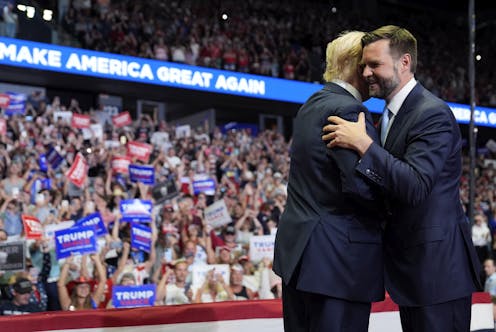JD Vance’s selection as Trump’s running mate marks the end of Republican conservatism
Dwight Eisenhower, Ronald Reagan and other avatars of American conservatism wouldn’t recognize it under Trump.

Since Donald Trump chose Ohio Sen. JD Vance as his running mate, it’s been widely noted that Vance once described Trump as “reprehensible” and “cultural heroin.” However, the day after Vance won his own Senate race in 2022, he reportedly made it known that he would support Trump for president in 2024.
Given this dramatic change, what does Vance’s selection mean for the Republican Party and conservatism, the political philosophy that the GOP once claimed to embrace?
I am a political scientist whose research and political analysis focuses on the relationship between Trump, the Republican Party and conservatism. Everyday citizens define conservatism in different ways, but at its root it is a philosophy that supports smaller and less-centralized government because consolidated power could be used to silence political competition and deny citizens their liberties.
Since 2015, Trump has tightened his grip on the Republican Party, moving it further away from its professed conservative ideology. The choice of Vance as Trump’s running mate – and the competition that preceded it – are the latest steps in this process.
Vance came from a small pool of contenders that included other noteworthy politicians who likewise once vehemently opposed Trump. By examining their trajectories, we can see how the Republican Party has abandoned conservative values to serve a single man.
Elise Stefanik
Elise Stefanik ran for Congress in 2014 from a district in upstate New York as a mainstream Republican who admired Rep. Paul Ryan of Wisconsin. Ryan was a traditional conservative who had run for vice president alongside former Massachusetts Gov. Mitt Romney in 2012. Romney endorsed Stefanik for Congress, saying that she was “a person of integrity. Every campaign is different, but values don’t change.”
But Stefanik’s values did change. When forced to share the ballot with Trump in 2016, she couldn’t even “spit his name out,” according to Republican consultant Tim Miller. But early in Trump’s presidency, she became a vocal ally, eventually replacing Rep. Liz Cheney as chair of the House Republican Conference in 2021.
House Republicans ousted Cheney from that position after she criticized Trump’s refusal to support the 2020 election results and his actions during the Jan. 6 attack on the U.S. Capitol. Cheney justified her opposition to Trump by highlighting her respect for the rule of law and support for limited government – even when those positions meant opposing her own party leader. These are foundational conservative principles, centered in aversion to consolidated government power.
This switch was a significant moment in the party’s ideological transformation. Stefanik’s rising star subsequently landed her in the mix for vice president, which she called “An honor. A humbling honor.”
Marco Rubio
Florida Sen. Marco Rubio challenged Trump for the 2016 Republican presidential nomination. During that race, Rubio issued a news release calling Trump a “serious threat to the future of our party and our country,” and blamed him for ushering in a climate of violence.
Statements like these made sense coming from a serious conservative whose worldview was defined by his family’s Cuban heritage and who opposed communism, tyranny and excessive government power.
Eventually, though, Rubio became a Trump ally. He voted to acquit Trump in his second impeachment trial in 2021, which centered on charges that Trump had incited an insurrection. In line with Trump’s wishes, Rubio opposed establishing an independent commission to investigate the Jan. 6 events.
In early 2024, Rubio was asked in an ABC interview if he really wanted to be vice president even though Trump had defended calls by Jan. 6 insurrectionists to hang former Vice President Mike Pence for certifying the 2020 election results.
“When Donald Trump was president of the United States, this country was safer, it was more prosperous,” Rubio responded. “I think this country and the world was a better place.”
This refusal to acknowledge and challenge Trump’s apparent support of lawlessness by his followers was an abdication of fundamental conservative values.
Tim Scott
South Carolina Sen. Tim Scott has touted his conservative values and principles throughout his political life. It was logical for him to endorse Rubio as Trump gained momentum in the 2016 Republican primaries.
In 2017, Scott insisted that Trump’s failure to condemn white nationalists after violent clashes in Charlottesville, Virginia, compromised his moral authority. Not long after, however, Scott met with Trump about his comments and was convinced that Trump had “obviously reflected” on what he said.
When Trump refused to flatly condemn white supremacists a few years later in a 2020 presidential debate, Scott suggested that Trump “misspoke” and should correct the comments, but added, “If he doesn’t correct it, I guess he didn’t misspeak.” After dropping out of the Republican primaries in 2024, Scott endorsed Trump as someone who could “unite the country.”
Why Vance?
These converted Trump allies still hold modern conservative stances on issues such as abortion and health care. But in seeking to become Trump’s running mate, they tacitly endorsed an executive’s attempt to overturn a democratic election and subvert the liberties of U.S. citizens. Such a shift violates the spirit of conservatism.
These politicians have also moved away from conservative principles in areas including U.S. foreign policy and immigration. But the fundamental shift that is most profound is in their attitudes toward abuse of government power.
What should we make of Trump choosing Vance, who once privately compared Trump to Hitler but now says that he would not have readily certified the 2020 election if he had been in Pence’s shoes?
Many considerations affect the choice of a running mate. But Vance doesn’t represent a swing state. He probably won’t appeal to MAGA-skeptical independent voters who have yet to make up their minds about who to vote for.
Instead, people close to Trump call the 39-year-old Vance the new heir to Trump’s MAGA movement. Vance is more than a protegé, though; he embodies Trump’s influence on the Republican Party’s evolving relationship with government power and insists his political conversion is genuine.
If there was any speculation that Republicans would revert to some form of traditional conservatism after Trump leaves politics, the prospect of a JD Vance presidency makes clear that the answer is no.
Karyn Amira does not work for, consult, own shares in or receive funding from any company or organization that would benefit from this article, and has disclosed no relevant affiliations beyond their academic appointment.
Read These Next
Why US third parties perform best in the Northeast
Many Americans are unhappy with the two major parties but seldom support alternatives. New England is…
Abortion laws show that public policy doesn’t always line up with public opinion
Polls indicate majority support for abortion rights in most states, but laws differ greatly between…
From moral authority to risk management: How university presidents stopped speaking their minds
Nearly 150 universities and colleges have adopted institutional neutrality pledges since 2023.






